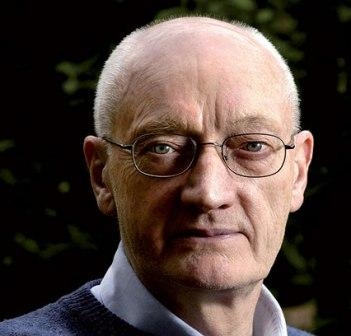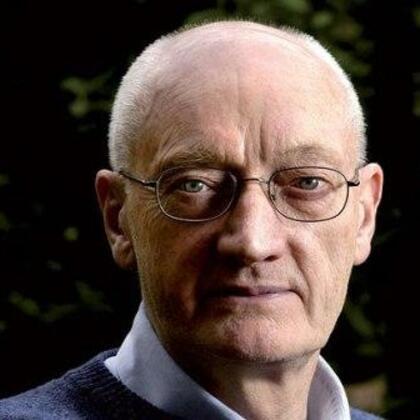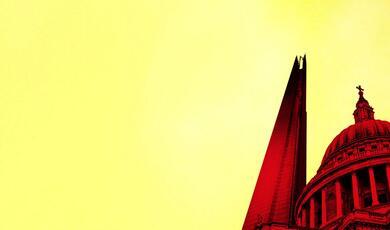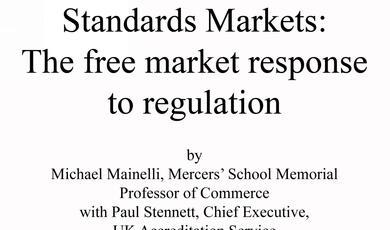What Is the Use of God?
Share
- Details
- Text
- Audio
- Downloads
- Extra Reading
God has been used in many ways in human history. This lecture will look at some of these uses and offer an approach that will help us to explore the possibility of experiencing transcendence in the midst of transience.
Download Text
4 November 1998
What is The Use of God?
Professor Richard Holloway
In 1970 we bought a cottage in Perthshire, above a river, a few yards from a farm. I learnt later that the farmer's wife had complained to her neighbours that "a God botherer" had moved into the empty cottage down the road. Annoyed at the time, I came to cherish the description as containing a lot of truth. God does bother me or, to be more accurate, I am bothered about God. There are people of whom that cannot be said. They either have a settled belief in God or a settled unbelief. In either case the question of God does not bother them; they have resolved it, one way or the other. The use of the verb "resolved" suggests the result of a process of applied consideration, the end of an exploration or period of research into the matter that yields acceptable conclusions, either for or against the question, "Is there a God?" I suspect, however, that it is never really quite like that. Believers often describe faith as a gift, something given, something they find themselves having; maybe settled unbelief is also a gift, something people find themselves holding to without too much anguish or thought about the matter. It is true, of course, that some people come to faith in a moment of crisis, a turning point; just as some people lose it in the same way; but even this does not quite alter the gift relationship. Gifts can be withdrawn as well as presented, but the giving or the losing of the gift still suggests something that happens to people rather than something they have carefully worked out for themselves. There are people who find themselves with convictions on this question of God, for or against, and when challenged they can offer perfectly respectable justifications for the convictions, but there is still an underlying sense that belief or unbelief is something that happened to them. Even agnostics have a certain settled quality about them. They have settled for knowing that they do not know whether there is a God; they say that, since it is impossible to settle the question one way or the other, they have contentedly settled for not knowing. But even agnostics have the certainty of knowing that there is no way of knowing whether there is a God, so they are more like settled believers or settled unbelievers than God botherers. God botherers experience little of this consoling confidence of conviction, because both the possibility and the impossibility of God nibble at their soul - the phrase comes from Emily Dickinson's poem, "This World is not Conclusion":
This world is not conclusion.
A Species stands beyond -
Invisible, as Music -
But positive, as Sound -
It beckons, and it baffles -
Philosophy - don't know -
And through a Riddle, at the last -
Sagacity, must go -
To guess it, puzzles scholars -
To gain it, Men have borne
Contempt of Generations
And Crucifixion, shown -
Faith slips - and laughs, and rallies -
Blushes, if any see -
Plucks at a twig of Evidence -
And asks a Vane, the way -
Much gesture from the Pulpit -
Strong Hallelujahs roll -
Narcotics cannot still the Tooth
That nibbles at the soul -
God botherers cannot still the Tooth that nibbles at the soul. People who suffer from this condition do not necessarily want to be polemical or negative in their dealings with the other approaches. However, the fact that they tend to place a heavy premium on personal honesty leads them to identify the many ways in which God claims are misused. The voice that people use in this discussion is very important, so I want to find a tone that does not sound dismissive of the settled approaches I have touched on. Good people believe and do not believe that God exists; and some other good people believe that it is impossible to know whether God exists. Some people seem to be unable to settle for any of these attitudes, so let me cut directly to the question that nibbles at their souls
We know that our planet is a tiny speck in a corner of a galaxy of billions of stars in a universe of billions of galaxies. Given the size of the universe, it is possible that the conditions that gave rise to life on our planet have been replicated elsewhere, but it is also possible that in all that unimaginable vastness, the mere thought of which so terrified Pascal, we are the only conscious creatures. It is possible that only in our planet, among a perfect infinity of possibilities, life has evolved to consciousness; so that only here, on this tiny dot, has the universe become conscious of itself and we have started thinking. The thing that bends the mind is the question, Was there ever just nothing, and from that nothing did all this just spontaneously come forth? It is the existence of the universe, the being of Being, and our ability to think about it, that is the tooth that nibbles at the soul. In some people, the questions have induced such anxiety, and such a desperate need for settled answers to still the vertigo in the mind, that we confront the strange spectacle of thinking creatures in a universe that is intrinsically mysterious, and from which they can deduce no obviously incontrovertible answers to the question of its meaning, roasting each other alive over the status of their conjectures on the matter. The claim to absolute knowledge, particularly in this area, has to be highly suspicious. All absolute claims to final knowledge of the meaning of things have to be cognitively dubious, though we would probably want to admit that they may serve a useful purpose as survival mechanisms in a lonely universe. Today we recognise the importance of giving people the freedom to hold absolute opinions, as long as they do not derive from them the right to torture and persecute others into holding them as well. Ironically this tolerance towards absolute systems that are themselves intrinsically intolerant is a gift of the post absolute or post religious era. Absolute systems, by definition, do not allow themselves the possibility of negotiating compromises with other absolute systems. Historically, tolerance was forced on the contending absolutes by external force, as much as by internal exhaustion. But it is worth remembering in our tolerant and pluralist era that many of the conjectures about the meaning of the universe that have been given in the past have claimed absolute status for themselves, and asserted their right to impose themselves on others. The paradox of our era is that we extend toleration to systems of belief that are themselves intrinsically intolerant and abhorrent to modern consciousness. Let me remind you of an example from recent history.
One of the more diverting religious news stories of 1998 was about the Sunday school teachers in an Evangelical Church in the Midlands who told their students that Princess Diana was in Hell. One child, upset by the information, reported it to his mother, who told the press. The teachers were interviewed on a radio programme and argued, logically from their point of view, that the Bible teaches that unrepentant sinners go to Hell. Since Diana had died suddenly, and almost certainly unprepared and unrepentant, it followed that she must be in Hell. I was not sure whether to feel grudging admiration for their almost heroic disregard for public opinion or horror at the primitivism of their belief system. However, it is worth remembering that the belief system they held would have been very familiar to most Christians throughout history. It was indeed taught that dying in unrepented sin guaranteed eternal punishment, and this grisly doctrine is an extension to one of the answers to the question about the meaning of the universe that humans have constructed. The system taught that this life was only a prelude to a more important life beyond, and the way we lived, including the way we thought, would have eternal consequences. From the point of view of our topic tonight, it mattered eternally how you answered the question about life's meaning. Get it wrong, and you could find yourself in an eternity of torment. It was this conviction about the fundamental and eternal consequences of holding the right answer to the question posed by life that led to the great missionary expansion of Christianity. If you were persuaded that knowing the right answer to the question life asks determined your eternal status, for weal or for woe, it would obviously have a profound effect on your attitude to other people, including people you would probably never meet, people in other lands, for instance. If you were a kindly person, you would want to share the saving secret with them, because it would rescue them from a horrible fate beyond death. You might even persuade yourself that the issues were so momentous for the souls concerned that even torturing them to death in order to get them to accept the saving formula would be justified, for what does a few hours of torment in this life compare to an eternity of torment in the life to come? True believers in absolute systems would see torture unto death as a therapeutic intervention, like surgery, that was designed to save not destroy the soul.
The important thing to note about religions that make these absolute claims is that, logically, they are mutually exclusive. Even within the Christian religion, for instance, there is claim and counter claim about the absolute status of different types of belief. The logic is easy to describe, if impossible to justify, and goes something like this. Only Christians can be saved; we know that this group, though it claims to be Christian, is not really Christian, because it does not conform to our definition of Christianity, which is the only true version; therefore those who cleave to this version of Christianity cannot be saved unless they repent and conform henceforth to our understanding of the faith. I have actually had something like that said to me on several occasions. Recently, for instance, I was accused by a Christian leader of leading people to Hell, where I was probably heading myself, because I was not warning gay and lesbian people that if they engaged in same sex practices they would be punished eternally for their sin. The difficulty with all absolute systems is discovering some criterion by which one might choose between them. An amusing item from the Internet illustrates the problem perfectly.
"A thermodynamics professor once wrote an exam for his graduate students. It had one question: 'Is Hell exothermic (gives off heat) or endothermic (absorbs heat)? Support your answer with proof'. Most of the students wrote proofs of their beliefs, using Boyle's Law (gas cools off when it expands and heats up when it is compressed) or some variant. One student, however, wrote the following: 'First, we need to know how the mass of Hell is changing in time. So, we need to know the rate that souls are moving into Hell and the rate they are leaving. I think that we can safely assume that once a soul gets to Hell it will not leave. Therefore, no souls are leaving. As for how many souls are entering Hell, let's look at the different religions that exist in the world today. Some of these religions state that if you are not a member of their religion, you will go to Hell. Since there are more than one of these religions and since people do not belong to more than one religion, we can project that all people and all souls go to Hell. With birth and death rates as they are, we can expect the number of souls in Hell to increase exponentially.
Now we look at the rate of change of the volume in Hell, because Boyle's Law states that in order for the temperature and pressure in Hell to stay the same, the volume of Hell has to expand as souls are added. This gives two possibilities: #1: If Hell is expanding at a slower rate than the rate at which souls enter Hell, then the temperature and pressure in Hell will increase until all Hell breaks loose. #2: Of course, if Hell is expanding at a rate faster than the increase of souls in Hell, then the temperature and pressure will drop until Hell freezes over. So which is it? If we accept the postulate given to me by Ms Theresa Banyan during my freshman year: "It'll be a cold night in Hell before I sleep with you", and take into account the fact that I still have not succeeded in having sexual relations with her, then #2 cannot be true, and so Hell must be Exothermic'.
This student got the only A".
Each of the exclusivist religions mentioned in this parable would claim that they had received the particular knowledge of their own absolute truthfulness from God through some form of revelation. How are we to discern between the rival claims? What makes discerning between them impossible is that all we can see is the human end of this revelatory mechanism. The scriptures they point to as evidence of the divine status of their faith are themselves clearly human creations. The most obvious evidence of this is that they are written in language and language is a human invention - there is no language we know that is not something we have ourselves created - so it is impossible to get behind the human telling or setting forth of these allegedly divine claims to the divinity as it is in itself, divinity neat, divinity unmediated. This is the frustration of all language, of course, not just language about God. Things are not what we say they are. The word water is not itself drinkable. Words point to things, but they are not the things they point to. This may seem too obvious to waste time on, but it is a truth that is often ignored in religious circles. All theology is, ultimately, a frustrating attempt to express the inexpressible. God is the elusive mystery we try to capture and convey in language, but how can that ever be done? If the word water is not itself drinkable, how can the words we use to express the mystery of God be themselves absolute? They are metaphors, analogies, figures of speech, yet religious people have slaughtered and condemned each other over these experimental uncertainties. Our glory and agony as humans is that we long for words that will no longer be words, mere signifiers, but the very experience they are trying to signify; and our tragedy is that we can never succeed. The words themselves can never slake that thirst. But there is something that comes close to it. There is a human experience that sometimes captures the mystery of otherness that haunts us, becomes co-equal with it, almost becomes it. Music is normally held to be the experience that does this best. It is what George Steiner called "the perfect tautology of form and content". It evidences itself, is itself the experience we experience and not just a sign or symbol for something else. All great art does this. It breaks through the frustration of language and unites us with that which language only usually signifies. I say, "only usually", because there is a language that, like music and art, is also capable of this same perfect tautology, this mysterious equivalence between the longing and the thing longed for. I am, of course, talking about poetry. Art, music, poetry are all priestly in their ministry, because they unite us with transcendence, place us in the very midst of otherness, rather than talk unceasingly and ineffectively about it, which is what religion usually does.
It is a useful working assumption, therefore, that the presence of the mystery of Being that haunts us may in some sense be experienced through language, but can never be contained or defined by language. It follows that any claim that a particular way of talking about or defining the mystery that besets us is equivalent to or a perfect expression of it, so that the words are the reality they point to, must by definition be false. Language, even the most sublime language, is only language. It is the way we try to describe or express our perception of what we see before us in the universe; it is the way we order our understanding of what is in front of us; but it is not the thing itself. Even if we do believe in the reality of God, our language about it, however prompted by or responsive to the divine reality it may be, is still our language, our creation, our thing, so absolute claims on its behalf have to be wrong. They are worse than wrong, they are silly. And the fact that there are many absolute systems with no infallible method, beyond the world, beyond human language, by which we can finally judge them, would suggest that it is better to assume that they are all human constructs or projections of our own angle on reality. It follows that, while understanding how they work and having some sympathy for the need in humankind that has given rise to them, we no longer have to be scared of them as though they actually were what they claimed to be.
One of the things we have created by much of our religious language is a mistrust of life itself, a sense that it is not something to be enjoyed and celebrated, but a mournful prelude to something else, a testing place, a sinister game in which the participants have themselves to discover the rules. From time to time some group claims that it has found the only valid rule book and secures a following to play the game of life according to its particular system. "Play it this way", they claim, "and you'll make it home to where you really belong". So we can spend our lives not in living, but in trying to interpret our lives, according to some system of belief that points us away from the life we are actually having to an entirely hypothetical life about which we can know nothing. A better way to approach the business is to begin by accepting that this life is it; that this actual being that we have and the universe in which we have it, no matter how it arose, is IT, so that this is what we must get on with.
W.H. Auden said of E.M. Forster that he was a person who was so accustomed to the presence of God that he was unaware of it. If God is the author of Being, then to be is already to be in God, so it is the fact and the being of Being that is the sacred thing, not how we interpret it. So the paradox could be true that those atheists who live life gratefully, kindly, unselfconsciously, may be closer to the mystery of God than life denying theists who are more concerned with making it safely to the life beyond than in enjoying the life they already have. There may be something of this sense of the anonymous or latent presence of God in the gracious living of life itself in the parable of judgement in Matthew chapter 25, where Jesus describes the surprise of a group of people who had lived their joyful and generous lives completely oblivious to the fact that they were living them in God and serving God through them; whereas the ones who had carefully charted their life according to a system that claimed to be from God discover that their religion is the very opposite of living truly in God. It would appear to be the case, therefore, that it does not much matter whether one believes in God, but that it matters a great deal how one lives and how one responds to life; so the paradox remains that some apparently godless yet celebratory ways of living may turn out to be further in to God than much that passes for official divinity.
If we accept, if only for the sake of argument, that all religious systems and all language about the mystery we call God are, as far as we are concerned, fixed inescapably on the human side of the equation, so that we can only see and be in touch with the human effect and never the allegedly divine cause; and if we accept, if only for the sake of argument, that if there is that which we call God we can only be in touch with it through our own life and the life of the universe in which we are set; then one way to use what we might call the great guesses about the mystery of God, the religious narratives and traditions, is to give them human meanings, apply them to our own lived experience, and see what they can teach us, what discoveries we might make through them, what guidance we might derive from them. The best way to use the God mystery, the great question of the meaning of Being, is to allow it to overwhelm us with wonder in the presence of life itself. This is what believers call Worship, acknowledging the worth of the mystery of Being. One way to get into this attitude of worship is to contemplate the extraordinary fact of the universe and of our place in it.
There were two remarkable stories this year that overwhelmed me with the kind of wonder I am talking about. One was about the Sun, not the newspaper, but the vast thermo-nuclear reactor in space whose unbelievable heat makes life possible on earth. To us the sun appears to be the largest and brightest of the stars, but it is actually the smallest and faintest. The illusion arises because of its comparative nearness - it is only 93 million miles away, while the next nearest star is nearly 300,000 thousand times as far away, more than four light years. To get some idea of how far that is, consider that light traverses the 93 million miles from the sun to earth in only eight and half minutes. In four light years, it travels more than twenty trillion miles. The sun is a dwarf star, lying in a region of our galaxy, the Milky Way. Our galaxy contains about a hundred billion stars, ranging in mass from a few percent to a hundred times the mass of the sun. And that is only our galaxy. There are many billions of galaxies in the observable universe. Our planet earth is a puny object in a violent, unbelievably vast and expanding universe, yet it has remained hospitable to life for at least three and a half billion years. Our very existence is a consequence of the stability of the sun, which has been burning long enough to allow life to evolve and flourish on our planet.
Earlier this year we caught a glimpse of the violence of that great burning star that makes our life possible. Scientists detected a shockwave on the sun. Solar flares that eject vast sheets of radiation more than 300,000 miles out into space leave behind seismic quakes of unbelievable proportions. If you think of the ripples that are created when you drop a large rock into a pool of water, you can begin to imagine solar ripples, two miles high from the surface of the sun, accelerating in the course of an hour from 22,000 to 250,000 miles per hour before becoming lost in the flames. Scientists have mapped great tornadoes whipping round the Sun at more than 100,000 miles per hour. And it is that violent and blazing star whose light and heat come to us from 93 million miles away that allow us to sit here today thinking about it all. And that act of thought is as great a wonder as the universe. We are a sub-microscopic dot in a tiny corner of a small galaxy in a universe containing billions of galaxies, but in us the universe has become conscious, has started thinking about itself. The Sun is not thinking about itself as it burns; the universe is not thinking about, not conscious of itself, as it explodes through space; but we are. Something is going on in us that is as wonderful and miraculous as the universe itself. And it brings me to my second story.
At the end of May a man called Tom Whitaker reached the top of Mount Everest after a climb of 29,028 feet. By any standard, to reach the summit of Mount Everest is an extraordinary achievement; what makes Tom Whitaker's success even more spectacular is that he lost his foot in a car accident 19 years ago. His climb in May was his third attempt. In 1989 he got up to 24,000 feet before abandoning the climb, because of frostbite and altitude sickness. Six years later he was forced to stop at 27,500 feet when his oxygen supplies ran low. At the end of May he did it. It was an act of extravagant recklessness as awe inspiring in its own way as the fury of the sun whose explosive constancy makes our life possible.
There is something in our universe that calls us to such recklessness and extravagance. We see the same passion at work in great artists and composers, in great explorers and scholars, in the great social reformers. A burning love and passion kindle them into life, into thought, into heroic achievement, into poetry and art, into love and compassion, into daring and laughter and glory. When we let ourselves, we too can be ignited by the same creative recklessness that lies behind the universe, challenging us to live adventurously, to live up to the reality of things, not to be held back by our own fears and limitations, but to burn with joy that we are rather than that we are not. Meditating on the wonder of Being challenges us to live up to the measure of the universe and the mystery that called it into explosive existence. It would be hypocrisy to open our hearts and minds to the vastness of the universe and the heroic possibilities of human nature, if we ourselves become narrow and mean-spirited, if our hearts remain closed towards our neighbour. Meditation on the majesty and energy of the universe and our place in it should increase our love for humanity; it should widen, not narrow our hearts.
This extravagance that characterises the universe may be one of the keys to faith. For us God botherers it is not easy to believe in anything. If only the meaning of things could be made more obvious; if only the logic of faith were worked out to an inescapable conclusion; then we might have faith. But it is never like that. There is a yearning, unresolved quality to faith. In my own case, I do not so much possess faith as long for it, am haunted by its possibility, by the sense that there is a mystery in the universe that calls me to the quest for meaning. But who can afford such extravagance of effort for something so elusive and wind-flung? Who can afford to give up even part of their one life to the celebration of such glorious uncertainty? Why waste time on such a search? Well, given the way the universe is, some of us just cant help ourselves. The reckless, extravagant wonder of it draws us to want to live up to it, to want to give ourselves to great themes and possibilities, even to the possibility of God. It won't leave us alone; it draws wonder, tears, laughter and the strange, troubled passion of faith from us. The whole thing is bloody marvellous and something in me calls it God. And that is what E E.Cumming thought as well:
I thank you God for most this amazing
day: for the leaping greenly spirits of trees
and a blue dream of sky; and for everything
which is natural which is infinite which is yes.
(i who have died am alive again today,
and this is the Sun's birthday; this is the birth
day of life and of love and wings: and of the gay
great happenings illimitably earth)
how should tasting touching hearing seeing
breathing any - lifted from the no
of all nothing - human merely being
doubt unimaginable You?
(now the ears of my ear awake and
now the eyes of my eyes are opened)
© Richard Holloway 1998
This event was on Wed, 04 Nov 1998
Support Gresham
Gresham College has offered an outstanding education to the public free of charge for over 400 years. Today, Gresham College plays an important role in fostering a love of learning and a greater understanding of ourselves and the world around us. Your donation will help to widen our reach and to broaden our audience, allowing more people to benefit from a high-quality education from some of the brightest minds.


 Login
Login







